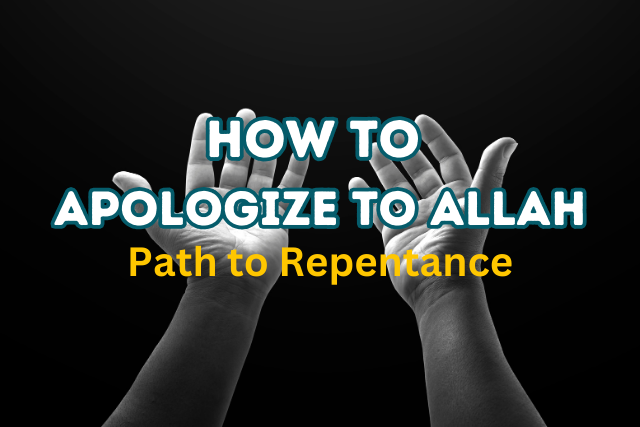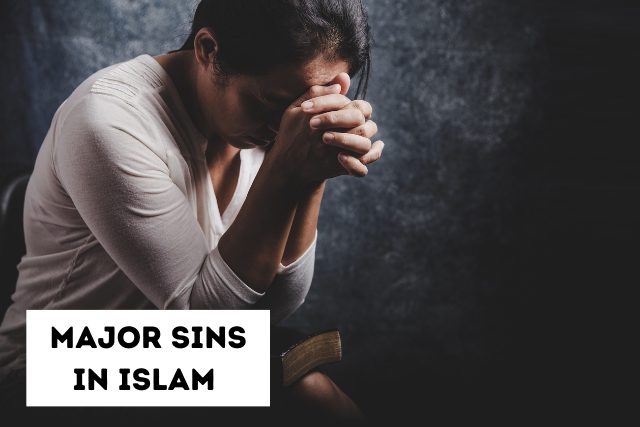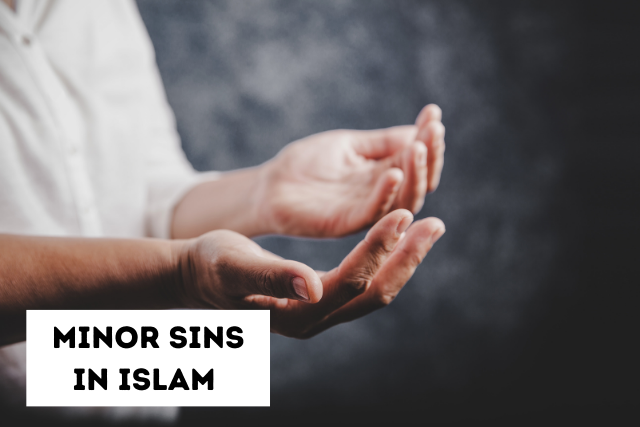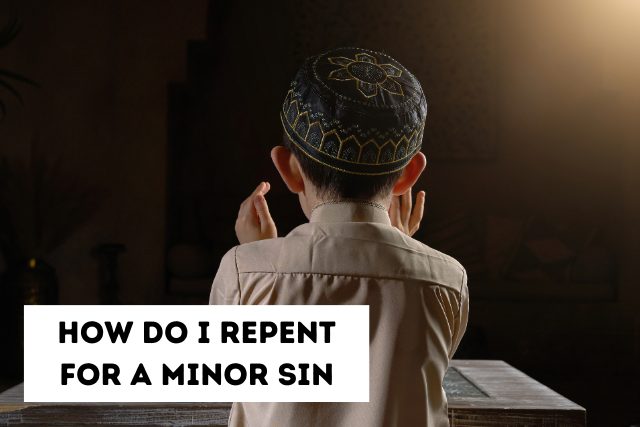How to Apologize to Allah | The Path to Repentance

Tawbah” in Arabic is this process that involves seeking forgiveness from the Creator for one’s major or minor transgressions. It’s not just an Islamic duty to seek forgiveness instead, it is a personal journey of reaffirming faith and strengthening our relationship with the Divine.
Apologizing to Allah is an essential practice in the life of a believer, as it symbolizes his willingness to return to the Most Merciful, of course, Allah. In this exploration, I will delve into the intricate aspects of how to apologize to Allah and the profound significance it holds in the lives of believers.
Before explaining “how to repent in Islam” let’s explore types of sins. There are two major types of sins, major sins and minor sins. Here are the major and minor sins:
Major Sins in Islam

Major sins, also known as “Kaba’ir” in Islam, are grave offenses with significant moral and spiritual consequences. Committing major sins can lead to severe punishments unless a person repents sincerely. Here are some examples of some essential sins.
Shirk (Associating Partners with Allah)
- Considering anything or anyone as equal or superior to Allah.
- Engaging in idolatry or polytheism.
- Believing in multiple gods.
Murder
- Unlawful killing of an innocent human being.
- Taking another person’s life intentionally.
Adultery and Fornication
- Engaging in sexual relations outside a lawful marriage.
- Violating the sanctity of the marital bond.
Theft
- Stealing another person’s property or wealth without permission.
- Violating the rights of others.
False Testimony
- Bearing false witness, especially in legal or judicial matters.
- Lying under oath or giving false statements.
Usury (Riba)
- Engaging in usurious practices, such as charging or paying interest, is riba.
- Profiting unfairly from financial transactions.
Consuming Alcohol or Intoxicants
- Drinking alcohol or using intoxicants.
- Diminishing one’s ability to reason and act responsibly.
Slandering Chaste Women
- Accusing a chaste woman of adultery without proper evidence.
- Damaging a person’s reputation unjustly.
Minor Sins in Islam list

Minor sins, also known as “Sagha’ir,” are less serious offenses that do not carry the same weight as significant sins. However, they are still discouraged in Islam, and seeking forgiveness for them is recommended. Here are some examples of minor sins:
Backbiting and Gossip
- Speaking ill of others behind their backs.
- Sharing harmful information without a legitimate purpose.
Wasting Resources
- Squandering wealth, food, or resources without necessity.
- Failing to be mindful of Allah’s blessings.
Arrogance and Pride
- Excessive pride and arrogance in one’s abilities.
- Looking down upon others with disrespect.
Neglecting Family Duties
- Failing to fulfill responsibilities towards family members.
- Disobeying parents or mistreating relatives.
Neglecting Charity (Sadaqah)
- Withholding acts of charity and kindness.
- Only assist those in need when able to do so.
Significant sins are more severe, but sincere repentance and seeking Allah’s forgiveness can lead to forgiveness. This applies to both major and minor sins in Islam.
How Do I Repent For a Minor Sin?

Sincere Regret
Sincere regret is the first step in seeking forgiveness for a minor sin in Islam. It involves acknowledging the wrongful act and feeling genuine remorse in your heart. This emotional awareness is essential because it demonstrates your understanding of transgressing against Allah’s commands.
It’s not merely about recognizing the action as a mistake but genuinely feeling sorry for it. This sincere regret is a critical component of repentance, showing humility and willingness to admit errors. It sets the foundation for a heartfelt plea for forgiveness and emphasizes the importance of internal reflection.
Seeking Forgiveness
Seeking forgiveness from Allah is the next crucial step in repentance for minor sins. It involves actively turning to Allah, acknowledging your wrongdoing, and asking for His mercy and pardon. Here are the critical elements in this step:
Praying to Allah and engaging in additional prayers and supplication to Allah. This direct communication allows you to express your remorse and seek His forgiveness earnestly.
Specific Request
Be precise in your dua for forgiveness, addressing the minor sin you’ve committed. This specificity demonstrates your accountability and sincerity.
Avoiding Repeating the Sin
Repentance also entails a firm resolution not to achieve the same sin again. This commitment to change is an essential aspect of seeking forgiveness.
Giving to Charity
Offering voluntary charity (Sadaqah) is a way to purify your soul and seek Allah’s forgiveness. It reflects your willingness to make amends and demonstrate your remorse through positive actions.
By following these steps with sincerity and devotion, a believer can seek Allah’s forgiveness for minor sins and strive to maintain a righteous path, drawing closer to Him.
How To Repent In Islam For Major Sins?

Repentance for a Major Sin
Repenting for a minor sin in Islam is vital, emphasizing the importance of seeking Allah’s forgiveness and purifying one’s soul. It’s a multi-step process that involves recognizing the gravity of your actions, ceasing the sinful behavior, and seeking Allah’s mercy and pardon. Here’s a concise breakdown of the critical elements:
Realize the Grave Consequences of Sinning
Recognize that every sin, no matter how minor, distances you from Allah’s blessings and impacts your spiritual well-being. Understanding the potential consequences is essential to motivate sincere repentance.
Don’t Consider a Sin Minor
Avoid belittling minor sins, as they accumulate and can lead to a heedless attitude. Each disobedience to Allah should be acknowledged and taken seriously.
Stop Sinning & Resolve to Never Return to the Sin
Immediately halt the sinful behavior and commit to never repeating it. This resolve is a crucial aspect of repentance.
Regret Your Sins and Cry Over Them
Feel genuine remorse for your actions, and shed tears of repentance. Emotional connection to your wrongdoing demonstrates sincerity.
Perform Wudhū and Pray Two Rak‘ahs
After guilt, perform ablution (wudhū), and offer two units of voluntary prayer (rak‘ahs), seeking Allah’s forgiveness and guidance.
Follow the Bad with Good & Atonement for Your Sins
Balance minor sins with good deeds and acts of kindness, demonstrating your commitment to change.
Seek Forgiveness During the Best Time
Choose auspicious moments like the last third of the night or Fridays to fervently seek Allah’s forgiveness, as they favor acceptance of repentance.
Seeking Forgiveness
Seeking forgiveness from Allah is integral to returning to Him and repenting. It involves sincere supplication, asking Allah to pardon your sins, and seeking His mercy and guidance.
This act of humility and repentance reestablishes a solid and loving relationship with Allah. It recognizes His infinite compassion and willingness to forgive those who seek it sincerely.
Duas For Forgiveness From Allah

رَبَّنَا ظَلَمۡنَآ أَنفُسَنَا وَإِن لَّمۡ تَغۡفِرۡ لَنَا وَتَرۡحَمۡنَا لَنَكُونَنَّ مِنَ ٱلۡخَٰسِرِينَ
They said: “Our Lord! We have wronged our souls: If thou forgive us not and bestow not upon us Thy Mercy, we shall certainly be lost.”
اللَّهُمَّاغْفِرْ لِي ذَنْبِي كُلَّهُ دِقَّهُ وَجِلَّهُ وَأَوَّلَهُ وَآخِرَهُوَعَلاَنِيَتَهُ وَسِرَّهُ ”
The Messenger of Allah (PBUH) used to say while prostrating himself: O Lord, forgive me all my sins, small and great, first and last, open and secret.
أَعُوذُبِكَ مِنْ شَرِّ مَا صَنَعْتُ
I seek refuge in You from the evil of what I have done
وَمَاكَانَ قَوْلَهُمْ إِلَّآ أَن قَالُوا۟ رَبَّنَا ٱغْفِرْ لَنَا ذُنُوبَنَا وَإِسْرَافَنَافِىٓ أَمْرِنَا وَثَبِّتْ أَقْدَامَنَا وَٱنصُرْنَا عَلَى ٱلْقَوْ ٱلْكَٰفِرِينَ
All that they said was: “Our Lord! Forgive us our sins and anything We may have done that transgressed our duty: Establish our feet, and help us against those that resist Faith.”
Conclusion
In conclusion, seeking forgiveness is a deeply personal and transformative process. It involves recognizing our mistakes, feeling genuine remorse, and seeking forgiveness with sincerity.
Seeking forgiveness from Allah is about acknowledging our imperfections and turning to the Most Merciful with humility. It’s about breaking free from wrongdoing and renewing our commitment to righteousness
Apologizing reminds us that, despite our flaws, we can always return to the path of righteousness. It allows us to draw closer to the Divine, finding solace and guidance in His forgiveness. It’s a timeless practice that enriches our faith and deepens our relationship with Allah.
FAQs
How to Apologize in Islam?
To apologize in Islam, follow these steps:
Acknowledge the wrongdoing.
Feel genuine remorse.
Cease the sinful behavior. Resolve not to repeat it.
Seek Allah’s forgiveness through sincere supplication.
How to Repent Sincerely to Allah?
Repentance to Allah involves:
Recognizing the sin.
Feeling genuine remorse.
Ceasing the sin.
Resolving not to repeat it.
Seeking Allah’s forgiveness in prayer.
Balancing sins with good deeds.
What Can Allah Forgive?
Allah can forgive all sins, including principal and minor, if the repentance is sincere. The Quran states, “Allah forgives all sins” (Quran 39:53).
How to Get Closer to Allah?
To draw closer to Allah:
Establish regular prayers.
Read and reflect on the Quran.
Engage in dhikr (remembrance of Allah).
Perform acts of kindness and charity.
Seek knowledge about Islam.
Make dua (supplication) earnestly.
Maintain good character and conduct.
How to Thank Allah?
Express gratitude to Allah by
Saying “Alhamdulillah” (Praise be to Allah) often.
Being thankful for blessings, big and small.
Using your blessings to benefit others.
Praying and making dua (supplication) of thanks.
How to Earn Allah’s Love?
To earn Allah’s love:
Obey His commandments and follow the teachings of Islam.
Perform acts of kindness and charity.
Seek His forgiveness through repentance.
Maintain sincerity in your worship.
Remember Allah through dhikr (remembrance).
Show patience in times of difficulty.
Be merciful and forgiving to others.






